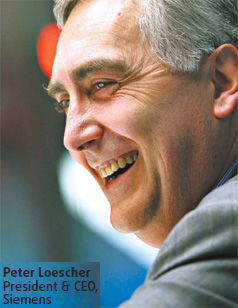Siemens to Bet Big on Green Spend
Adjust font size:
Siemens, Europe's largest engineering company, yesterday said it expected to get orders totaling 20 billion yuan (US$2.93 billion) from China's economic stimulus package in the next three years.
Among these orders, half would go toward energy efficient and environment friendly technologies, said the company yesterday.
"No one can say for certain what the global economy will look like after the crisis. But one thing is certain: it will be a greener and more sustainable economy than it was before the crisis," said Siemens' President and CEO Peter Loescher.
"The percentage of our company's revenue generated by our green portfolio will increase significantly. We will become even greener," he said.

In order to realize the 20-billion-yuan order, Siemens "will form a strategic alliance with the Chinese government, enhance R&D with local partners, and boost investment in the new energy industry," said Richard Hausmann, CEO, Siemens Northeast Asia, and president & CEO of Siemens China.
"China's demand for environment friendly technologies will remain robust. This will continue to be a strong growth area for Siemens in China," he said.
In line with China's 4-trillion-yuan stimulus program, Siemens in February announced an additional investment of 1.35 billion yuan to expand production capacities for alternative energies over the next three years, on top of the 10 billion mid-term investment pledged in 2006.
The company in May launched its first wind power equipment manufacturing plant in Shanghai, marking its entry into China's wind power market.
As China's stimulus package started showing first results, Siemens has got some orders in the country over the past few months, said Hausmaan.
For instance, the company's signaling, train control and propulsion systems have been inducted into China's first intercity mass transit system -- the Guangzhou-Foshan line in Guangdong Province.
Siemens earlier this month also signed an agreement with Weikang medical group in Shenyang to provide healthcare products and solutions worth around 70 million yuan.
Commenting on a recent move by China's policymakers to encourage the purchase of domestic products in government procurement, Hausmann said it was "understandable to some extent".
"We are also continuously calling for a level-playing field," he said. "It may be worth noting that Siemens has already become a local company."
The National Development and Reform Commission, along with other ministries, issued a notice in early June saying government-invested projects should make use of domestic products and services, unless they were unavailable in the country. Some analysts said the move was quite reasonable and that it was a universal practice.
Lu Jinyong, a professor at the University of International Business and Economics, said: "If products made in China by foreign-invested companies are regarded as Chinese products under the new regulation, foreign businesses will also benefit from the 4-trillion-yuan stimulus package."
(China Daily June 23, 2009)